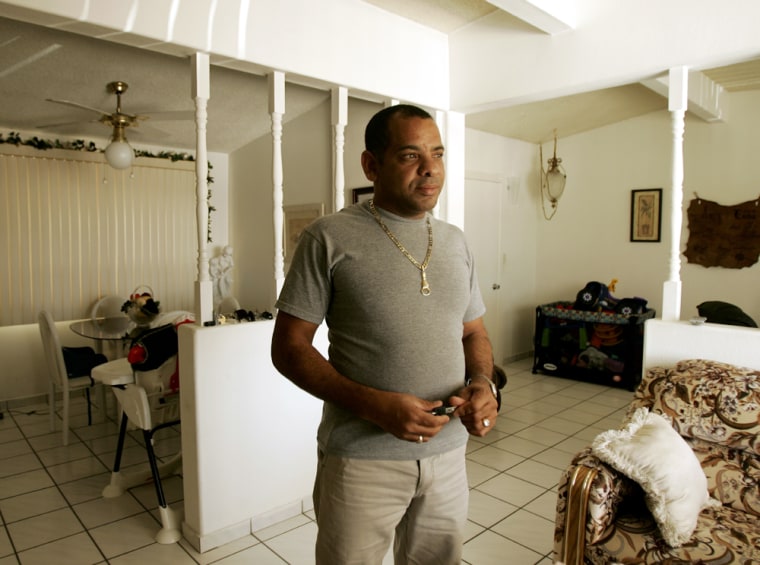Bernardo Heredia fled communist Cuba a decade ago, and this year loaned his lookalike younger brother his U.S. residency documents to help him do the same.
But what started in March as an act of familial love became a full-blown sacrifice when Cuban authorities got wise to the ploy and refused to let the elder Heredia leave the island, effectively switching the lives of two brothers.
Now, Heredia is living with his younger sibling’s wife and child, plotting an ocean escape similar to the one he went through in 1994.
“This is a nightmare,” Heredia, a U.S. resident who was born just 13 months earlier than his brother, said Tuesday outside his mother’s small apartment in western Havana. “I feel as if I were in prison.”
The best laid plan
It began when Heredia, 42, found out his younger brother, Fidel, planned to leave Cuba by sea. Heredia vividly remembered his own hellish, seven-day journey across the Florida Straits and devised what he thought was a foolproof way to avoid it.
In Havana on a family visit, Bernardo Heredia persuaded his brother to use his U.S. residency card and Cuban passport to leave on a plane for Mexico. Fidel Heredia, who turns 41 in July, then used his own documents to cross the Mexico border into the United States as a regular Cuban migrant.
Under the United States’ so-called “wet foot-dry foot” policy, Cuban migrants who reach U.S. soil generally are allowed to stay, while those intercepted at sea are usually returned to Cuba. U.S. officials say fewer than 1,000 Cubans reach American shores by sea annually, and it is unknown how many who undertake the risky voyage never make it.
With his own documents mailed back to him and no record of an arrival in Las Vegas, Bernardo Heredia imagined there’d be no problem flying back to the United States. But Cuban immigration officials stopped him at the Havana airport after realizing his passport had been used a few days prior.
‘This is revenge’
Heredia spent 30 days in a detention center. When he was released, he said, he was told he wouldn’t be leaving Cuba anytime soon.
“This is revenge,” he said. “They know that to live in this country is so bad and depressing that that is the punishment. The immigration officials ... said to me: ‘Your brother left, so you stay here.”’
Neither wife knew about the plan beforehand and both were — predictably — upset.
“My wife was furious at first,” said Bernardo Heredia, who met his Cuban-born wife in the United States. “Now she’s just feeling hopeless.”
A Cuban government official said Tuesday there was no immediate comment on the case.
The U.S. government can’t do much because the elder Heredia never obtained American citizenship. “The government of Cuba has the sole legal authority to grant exit permission from Cuba for its citizens,” a statement from the U.S. Interests Section said, urging Cuba to grant all its citizens the right to leave the island.
Days in sadness
In Las Vegas, Bernardo Heredia drove a taxi and was studying to become a pilot. But here, he has no work, and spends his days in sadness, watching home videos he sent his mother of his daughter taking baths in the sink and learning to walk.
He stays at his brother’s house, a few blocks away from their mother’s apartment, with his sister-in-law and 8-year-old nephew.
Bernardo Heredia said he made another attempt in mid-May to leave the island in a raft, but the craft capsized, and he and his friend had to return, swimming seven miles. “I’m not as young as I used to be,” he said.
Despite the failed attempt, Heredia said he would try again. “Staying here is not an option,” he said. “I have to be with my family.”
Bittersweet in Las Vegas
In Las Vegas, Fidel Heredia’s days are bittersweet, the excitement of a new life shadowed by his brother’s predicament.
“I feel quite uncomfortable with the situation,” he said in a telephone interview. “We never expected that this would happen.”
The younger Heredia lives with his brother’s wife and their 2-year-old daughter, who sometimes mistakes her uncle for her dad. He works a night shift cleaning a casino and studies English.
“It’s marvelous here — the total opposite of Cuba,” he said. “One breathes freedom. You can feel it.”
After years of receiving financial help from his brother, Fidel Heredia realizes he soon will be the one sending money to Cuba. “Very few brothers would make the sacrifice he made,” he said. “I am eternally grateful to him.”
